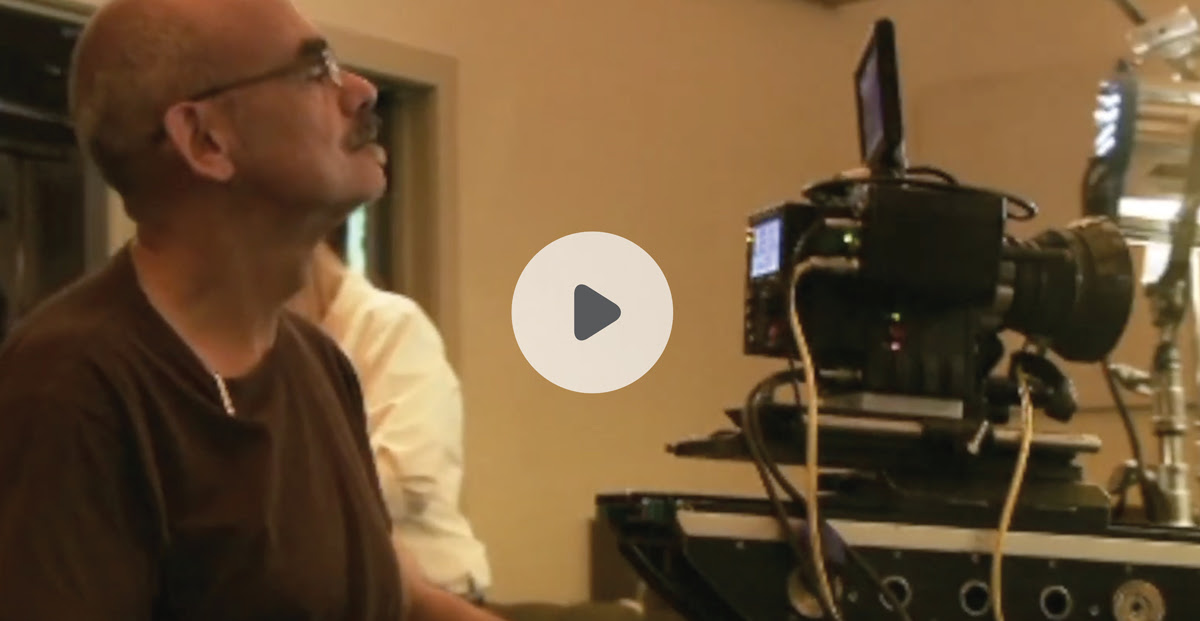Why I made friends with robots.
by Alex Fernbach
We know that Motion Control can be intimidating, but it doesn’t have to be! Today’s MoCo technology is easier than ever to master. Let me show you how MoCo makes precision moves manageable, so getting the shot can be fast, cost-effective and maybe even ‘good times’.
MoCo is about the mindset.
As a Cinematographer, DP, and Effects Supervisor, I’ve come to rely on non-linear problem solving to arrive at the simplest and most cost-effective solutions. Start with the shot you want to create, then ‘zoom out,’ breaking it down into smaller, more manageable components. Next, envision how they all fit together. When you ‘zoom out’ this way, it’s easier to see all the facets of a single shot, and you open the door to ‘eureka moments’. For example, what looks like a complex camera-moving problem can often be reimagined, and you’ll discover that it’s simpler to move the object, instead.
Get the story behind the shot.
Getting the backstory helps you process the ‘how’ and ‘why’ behind great Motion Control executions. That’s always more valuable than just knowing ‘what’ was done. One side-by-side, time-lapse product shot demanded a novel solution… It started with two hand models smearing deodorant sticks on a sheet of sandpaper. Then came the 2-3 hours of time-lapse to show off the product’s performance. Because of the time-lapse, we wouldn’t know if we had a good take for hours. We also had to repeat this demo with several competitors’ products. We were severely crunched for time, but MoCo came to the rescue! We build 3 sandpaper cubes, then wrote a simple Motion Control move to turn the cubes from facet to facet. This way, we were able to shoot 12 takes at a time instead of one. In record time, our delighted client got about 50 takes to choose from! Now, any time you run into a similar problem, you’ll have a sense of how MoCo can help solve it.
Find a right-sized solution.
When you ‘zoom out’ and see the big picture, a shot that looks complex on the surface might be achievable with an absurdly simple solution. One commercial product job required oversized pills to roll out of a shot, revealing the ‘hero product’ in the background. The producer first came to us with an elements list a mile long. He envisioned the pills being actuated by arms from above, but given the production time it would have taken to shoot all the picture and matte passes, this would have been a herculean task. (Not to mention all the rig removal and reflection restoration)… The right-sized Motion Control solution was inexpensive and far from complicated. We put the pills on tiny sleds with a magnet, then ran a magnetic rig under the table to move them. Our magnetic rigging was invisible, the effect was in-camera, and the solution created ZERO post-production ramifications. Again, great success!
Don’t be afraid to ‘retro-tech.’
So, as you can see, being clever and inventive is infinitely more important than just having the latest gadget! I’ll tell you one more story about seeing things differently. On another shoot, we had a challenging water shot to pull off. We needed a high-speed macro shot of a pebble falling into the water, making a crown-shaped splash, but without seeing the stone. In linear thinking, one might say we have to hide the pebble somehow. By breaking it down and seeing all the angles, I was able to devise a simple solution. We cut a hole in the bottom of a shallow tank, stretched some latex across the gap, and connected a motion-controlled motor to push and pull the center of the latex creating a beautiful ‘crown effect’ without the pebble.
Lastly, get good advice.
I can’t imagine any aspect of cinema requiring a more ‘consultative’ approach than Motion Control. When you hire a motion control company, you should be getting some solid advice as to how best to achieve the desired shot. Work with a supplier who spends some quality time with you discussing the nuances of the shoot, planning out the schedule, resource allocation, and system redundancies. This sort of service and support helps your production to contain costs and deliver uncompromised creative work.
The takeaway.
Motion Control is a unique blend of analytical problem-solving and out-of-the-box creativity. Get your mind around big shots by breaking them down into smaller components; tailor the solution to the problem; and seek out the best advice you can get. You’ll be amazed at how this ‘Big Picture’ approach can help make your MoCo projects manageable, and even fun!
About Alex Fernbach.
Alex Fernbach is a Director and Cinematographer who’s worked on TV commercials for some of the world’s most iconic brands, as well as feature films, television documentaries, short films and trailers. He is an industry-renowned thought leader, having appeared as a featured speaker at major universities, film festivals and industry events.
Alex is an innovator at the forefront of Motion Control Technology and in-camera Visual Effects. The pursuit of this passion led him to design and invent the 1st Array Camera in the US, which he sold to ‘The Matrix’, producing the legendary ‘bullet time’ effect and revolutionizing cinema.
Alex is also the co-owner of Cobalt Stages, by-producers, for-producers turnkey soundstage in Hoboken, N.J. offering state-of-the-art production solutions, onsite and on location.
Learn about Virtual Productionand how to use it?
Cobalt’s got you covered. As the first company to offer Virtual Sets on the East Coast, we have the experience to guide you. Let’s have some fun 😉

